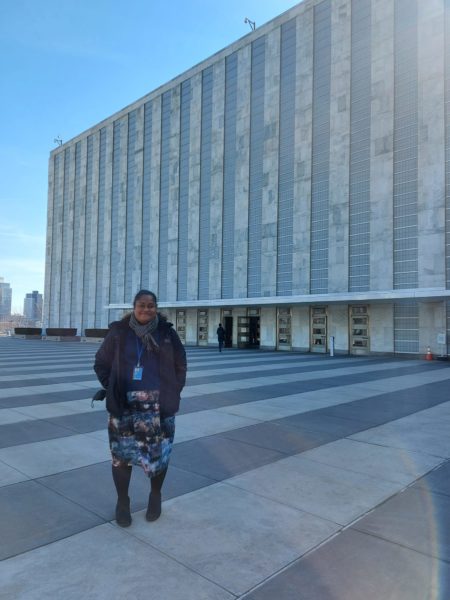“This is the Pacific CSW.”
This was the overwhelming message from Pacific leaders and women’s rights advocates at this year’s Commission on the Status of Women (CSW).

Carolyn Kitione, Learning Coordinator at the Shifting the Power Coalition outside of the United Nations HQ on the first day of CSW!
The Commission on the Status of Women (CSW) is the biggest gathering on women’s rights in the world. Hosted by the United Nations in New York, it brings together global leaders, campaigners, NGOs, and policymakers to discuss the work that is still required to achieve gender equality.
Finally, after 66 years, the gendered impacts of climate change are on the agenda. This year global leaders, women’s rights advocates and policymakers came together to take action towards achieving gender equality and empowerment of all women and girls in the context of climate change.
This year, our partners from the Shifting the Power Coalition, Sharon Bhagwan-Rolls and Carolyn Kitione, have been in New York talking to policymakers and advocating for climate solutions that are for Pacific women, by Pacific women. Flora Vano and Michelle Higelin from ActionAid also zoomed into the conference to advocate for feminist solutions to the climate crisis.
Why does the theme of CSW matter?
Climate change disproportionately impacts women and girls. It poses a threat to the livelihoods, health, safety and security of women and girls across the world. It is about time we talked about the gendered impacts of climate change, and the importance of supporting climate solution for women, by women.
The climate crisis cannot be understood, or resolved, without the leadership of women and girls. Women are agents of change, and it is vital we ensure women can meaningfully engage in, and shape, climate change policy and advocacy.
How does climate change impact women and girls?
In many regions, women bear greater responsibility for collecting food, water, and fuel. With women more reliant on natural resources for their and their family’s livelihood than men, they are hit hardest when climate change threatens their access to these essential resources.
Non-economic losses due to climate change, such as connection to identity, culture, and nature, are immense. In the Pacific, climate change is leading to the displacement of coastal and maritime communities from their homes, severing their connection with the land and nature, and threatening the survival of community identities and cultural practices.
“What is key here are the non-economic losses resulting from climate change. The losses where there is not just monetary value. There is our connection to identity, culture and spirituality, ecology, diversity, and services that support livelihoods, cultural practices, and holistic wellbeing,” says Frances Namoumou from Pacific Conference of Churches.
Climate change also exacerbates pre-existing gender inequalities, leaving women and girls more vulnerable to forms of gender-based violence. For Indigenous women, women of colour, older women, LGBTIQ+ people, women with disabilities and those living in rural, remote, or disaster-prone areas, the impacts of climate change are only further heightened. Climate change is not only a feminist issue, but also an intersectional feminist issue.
How is ActionAid working towards building an inclusive, feminist, and intersectional response to the climate crisis?
“We know that across the Pacific, simply treating women as victims in the context of climate and humanitarian crises is not the answer,” says Sharon Bhagwan-Rolls from the Shifting the Power Coalition.
Women can play a powerful role in supporting their community through the impacts of climate change and natural disasters. That’s why ActionAid is committed to Investing in localised women’s leadership through increasing women’s access to the resources and technology they need to lead.
In Vanuatu, the Women I Tok Tok Tugeta (WITTT) project, supported by ActionAid and the Australian Government, brings together over 4000 Ni-Vanuatu women across five islands to respond to the climate crisis and natural disasters. Through increasing women’s access to technology and resources, the WITTT project has provided local women with the opportunity to merge traditional and scientific knowledge to develop effective solutions to a changing climate. Women are now leading their community to respond to the climate change.
In Fiji, local women’s organisations established Women’s Weather Watch, a locally-led communications system. This women-led initiative links a network of women leaders and community members to real-time climate- and weather-related information.
Prior to the establishment of the initiative, local women had been excluded from designing, planning and implementing responses to natural disasters. Now, women are influencing key decision-making processes and transforming gender relations by demonstrating the power and potential of their leadership both during and beyond times of disaster.
“Collectively as women we can create the world how we want it to be…[and] we ask you to stand firm with us, with the women of the Pacific,” says Flora Vano, ActionAid Vanuatu.